"It felt as if they were hitting us with all the guns that exist."
Kharkiv, a major city in eastern Ukraine near the border with Russia, was among the first to be bombarded. Here Inna describes the horror of the bombing, the scramble to get supplies and her remarkable journey across Ukraine to safety in Slovakia.
 ADVERTISEMENT
ADVERTISEMENT
 ADVERTISEMENT
ADVERTISEMENT
"Well, this is how it all began for us: we slept quietly and peacefully. I went to bed late at five in the morning and then my daughter flies into my room: “Mum, I'm scared!” She heard the first explosions and woke. She looked somewhere on Telegram (she is a schoolgirl) and saw the war had begun. She ran shouting: "War!"
"I got up in some shock. What should I do? Dress? Run? Where? How? How to live with this? Everything is unclear. Then I hear explosions.
"The first thing we did was to collect things with trembling hands, not quite understanding what was needed and why. We sit at home, trembling. Explosions continue. We ran to the store because we have two cats, and if the war has started, what will we feed the cats with?
"The queues are huge. When we entered the supermarket, already there were gaps on the shelves: no canned food, no stew, nothing you could stock up with.
"In such a situation, you do not fully understand what you should take. We took two packs of milk, a pack of rice, as much as we could carry, tangerines, water.
"The next night was just hell. It felt as if they were hitting us with all the guns that exist.
"This was really scary.
"You don’t understand: is it them attacking you or is it our warriors trying to fight back, defending, not letting them into the city? We don't hear what is happening. We hear loud shots of heavy guns. I understand these are not submachine guns, but they are something heavy.
"I realised these were Grads [rockets], it was just that heavy weapons were fired in such a single stream. It was so scary! We didn't sleep.
"When some colossus flies at you, you do not understand what it is. Maybe, in fact, even 100, 200 or 500 metres away, but the sound is such it seems it is right above your head. My daughter and I literally clenched into some kind of fist, held each other's hands as best we could, and for some reason closed our eyes.
"Then, when it has flown by, you think 'thank God, phew!'. You have been spared, this time. But you understand it still exploded somewhere.
"The next day we did not have heating in the apartment and the lights went out. The temperature in the apartment dropped rapidly (it was around zero outside).
"I really felt bad. I remembered some prayers despite not believing it would seem in such things. I turned to heaven, I don't even know why.
"The next day we realised that we had no iodine, no sedatives, no heart medication. We ran to the pharmacy to buy the most necessary things and a supermarket because we understood that we would not last long without electricity. I did not open the refrigerator for a day in order to save at least something that is in there.
"We stood at the pharmacy for an hour and a half, the queue was another two hours. And then the shells began to fly again.
"They flew without alarm. We didn't hear any alarm at all. This is Saltovka (an area on the outskirts of Kharkiv) closer to the border, to Belgorod.
"There was no shelter. There was the Geroev Truda metro station, the last station on Saltovka, it took about 15 minutes to walk to it. They built it in an open way, that is, it is a shallow subway. It's not like walking into the subway and realising that you'll be sitting there for a while (safe). It was very scary to run there, realising that it was not so safe there.
"We went down to the basement of our house. The house has six entrances. The entrance (to the basement) is from two sides, from the ends, tiny: I could go there only by bending down. It's just a damp, dark, room. There is no light, nothing at all. If the explosion fills up the entrance, no one will ever find you there, it will be a grave.
"We didn't go down there. We have an apartment on the ground floor, opposite a nine-story building, we are somehow protected there.
"We didn't go shopping after that. These volleys, this shooting did not stop all day. We sat for a day without heating, then the water began to heat up a little. The light was also restored a day later, but it was impossible to turn on heaters and powerful appliances.
"I understood that my daughter and I had a maximum of food for a week.
"In the morning, a neighbour calls: 'Inna, do you need bread? Run, here at the corner of the house they brought bread, but there is a long line, they give two loaves. Run! I got in line for you'.
"I started to get ready, and then again these very loud explosions. In fact, you don’t understand for sure whether it’s in your micro-district or it’s far enough away and you still have time to go for bread. I did not go.
"And suddenly I remember that from some ancient times I had a bottle of vodka. I took out this vodka, put it next to me, I think if some kind of injury or something (happens), I will have vodka as salvation or to treat (wounds).
"On Tuesday, a classmate calls my daughter and says: 'I'm leaving tomorrow, one of my relatives will take me to the station. Come with me, there will be room in the car.'
"In the evening we collected all non-perishable products. They stuffed two cats into one carrier (they took a bag and just made holes in it). And here we were - with two cats, with two backpacks on our shoulders and one suitcase. We couldn't take any more.
"They came for us in the morning. We go out into the street and the atmosphere cannot be conveyed. Cars don't move, nothing does. People, if they move around, go very quickly, quietly, silently. We were just lucky that no one was bombing at that time.
"And you go out into the street and the silence and the cawing of crows is ominous. We rushed to this car (it could not drive into the yard). We saw that again there was a queue for bread. I think they looked at us with envy. But we plunged into this car, my daughter and I and a classmate. It was very scary because you understand that here you have at least some kind of shelter. What lies ahead for you?
"We arrived at the (Kharkiv) railway station in the hope that now we would leave for the West in a very combative way. Our 'combat' [would] stretch for another day.
"We have never seen so many people. There was an unrealistic number of foreign students. They were brought, probably by buses. There were a huge number of women with children. Their husbands followed them.
"The trains were literally stormed. People were in a panic, pushing their children, passing children over their heads. My child is 16 years old, this is the eleventh grade. We were told: 'Sorry, she is not a child.' We couldn't go.
"We were exhausted. Then we see a crowd running somewhere. Where are you running? Someone shouted: 'Train to Lviv'. The crowd is running to the train to go somewhere, and so are we. And we have backpacks, a suitcase, two cats.
"By the end of the day, we hadn't managed to get on any trains. We realised that was it. Then heavy gunshots began to be heard and we ran into the subway in wild fear.
"We spent the night in the subway. It was quite a deep station. There was water from a hose. I had a terrible dry mouth, we hadn't eaten anything, because it was impossible, and nerves (didn’t allow it). You started to eat something and you threw up.
"Most of them had some kind of blanket. We spent the night on the floor without any. But, to be honest, it was the first night when we did not tremble with fear, in the soul, it was more or less calm, (feeling) that a shell would not fall on you today.
"We slept for about an hour. By four o'clock we went (to the station), there was supposed to be a Kharkiv-Lviv train. We stood until six o'clock, the train did not come. We returned to the subway, slept for an hour or two.
"The next day at the station, thank god, the police appeared and there was already at least some order.
"On the second day, we were just lucky. The station worker said: 'Don’t wait here, this (train) will not leave soon. Platform one will be the first, then from platform four.
"We rushed to the first platform, but it was already packed with people and no one was allowed in. We raced to the fourth platform. There were fewer people there. People stubbornly stood there.
"When the train came, it was just some kind of unreal happiness. When it stopped, the doors were right in front of us. I held onto the handle with one hand to enter the carriage; with the other, I held off the crowd and then push the girls onboard. They helped me pull our suitcase on board and we were among the first onto the carriage.
"We travelled to Lviv. It was 50°C in the carriage. I figured it out later, there were 500 people in there. In one compartment, we had 17 people.
"Women sat on the floor, holding children. The kids slept like this all night. Only those on the second shelf could lie down and sleep. I stuffed my girls there, there were other people's things and they somehow lay somewhere between it all.
"It was really very hot, there was no air, the windows were [...] impossible to open. My daughter felt bad, I told her: 'Pour water on yourself, because there is nowhere to get off, it’s even worse here'.
"We drove in a complete blackout. Everyone (was told) to turn off their phones, turn off navigation, turn everything off. (We sat) in total darkness, you can’t look at the phone.
"But even then, despite so many people -- and both dogs and cats -- they all stuck together. There were no big scandals, everyone was understanding (to each other). Everyone was scared.
"It took 24 hours to reach Lviv with waits.
"We travelled to Lviv to get to Uzhgorod (a city in Ukraine near the border with Slovakia) and then to Slovakia to visit relatives. But we soon realised it would be difficult. If we got from Kharkiv to Lviv for free, then here we had to buy tickets. The queues at the ticket office were kilometres-long and there were zero places for getting to Uzhgorod.
"It's snowing outside. We began to look for other ways [to get to Uzhgorod].
"I found a minibus, but it was already packed with people, there was a queue for one more minibus. No one knows when the next bus will be. Nobody knows how to get to Uzhgorod.
"I ask taxi drivers at the station:
'What is the price for three?'
'Two thousand hryvnia per person.'
"We paid and went. Then, thank God, we safely arrived in Uzhgorod."












